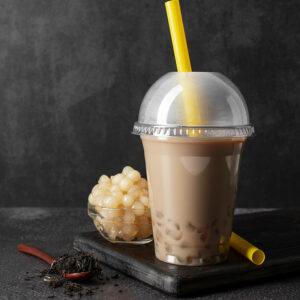PEOPLE still spend money on small indulgences during economic downturns. If Chanel lipstick is the go-to item for women, milk tea drinks are soothing China’s urban youth, who are dealing with stubbornly high unemployment.
Freshly made milk tea shops are just about on every street corner across the country. Some concoctions are essentially milk shakes with chewy tapioca pearls, or bubbles. Others may have fresh fruit added to the brew. Customers can choose green, black, or herbal tea, and the topping — whipped cream or cheese — among others. Last year, there were about 420,000 stores nationwide, generating 247 billion yuan ($31.4 billion) in sales.
Equally impressive is the flood of venture capital that has gone into the brands, making their founders, who often started out as humble street vendors, paper billionaires, or at least millionaires many times over. Shen-zhen-based Heytea, favored by the likes of IDG Capital and Hillhouse Investment, was valued at more than 60 billion yuan in 2021. Last year, Sichuan Baicha Baidao Industrial Co., owner of the third-largest chain Chabaidao, raised 970 million yuan. It went public in Hong Kong in April, pulling in more than $300 million.
For young people, these modern teahouses have become synonymous with leisure and relaxation. They like to sip while shopping and hanging out with friends, or during work breaks. Even waiting in line can be therapeutic, imposing a timeout to catch one’s breath.
But this milk tea culture also tells the tale of an economy defined and scarred by hyper competition.
With venture capital showing interest, brands see franchising, as opposed to managing stores themselves, as the only way to expand quickly and go public. Sometimes, they do so at the expense of their image and profitability.
There are about 50 such stores within less than a mile distance of major shopping centers, crowding each other out across China. At Chabaidao, for instance, an average shop generated 2.4 million yuan in sales last year, down 12% from 2021.
What’s so special about these tea drinks? To keep young people interested and coming, brands are searching for exotic fruits, and rolling out new concoctions weekly. Last year, Chabaidao introduced 48 new products, but that paled next to Auntea Jenny, which has filed a prospectus to list in Hong Kong. The Shanghai-based firm pushed out about 100 new flavors.
Some are encroaching into neighbors’ yards, too. Consider Changsha-based China Modern Tea Shop. The brand has blossomed in large part because young people who want to party have been visiting the city known for its vibrant night life and spicy cuisine.
After 4:30 p.m., customers can buy tea-fused cocktails (imagine the taste of Baileys in black tea, with whipped cream on top). But this also means that the company is competing with formidable operators such as Kweichow Moutai Co., now marketing its own baijiu-infused ice cream.
All this involution, a phrase that refers to entities copying and undercutting each other, brings little benefit to any, but raises the cost for all and necessarily leads to burnout. Share prices of Nayuki Holdings Ltd. and Sichuan Baicha, the two publicly listed names, have collapsed since their IPOs.
As a result, brands are looking overseas. Mixue, the country’s largest chain, has more than 3,000 stores outside of China. Heytea made a splashy New York debut late last year.
While some may be pleased that China is exporting its soft power, something is also very wrong with this picture. Heytea and Mixue operate in opposite segments — the former sells premium drinks and the latter dominates on the low-end. Apparently, neither feels secure in their home market.
In recent months, the US and European Union have been worrying that China is exporting its industrial overcapacity. In the case of electric vehicles, state subsidies were blamed. But that’s not the whole story. Even without government involvement, industries with rosy outlooks quickly become crowded.
Scale it till you make it — it’s the motto for succeeding in China. This milk tea craze is a good example.
Alas, for businesses, what started out as a nice way to capture young people’s desire to unwind and relax, has quickly become an intense workout and subsequent burnout. Chinese businesspeople are fleeing not necessarily from President Xi Jinping’s economic policies, but from each other.
BLOOMBERG OPINION
